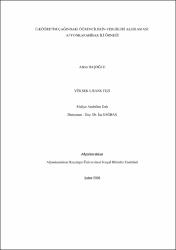| dc.contributor.advisor | Sağbaş, İsa | |
| dc.contributor.author | Başoğlu, Adem | |
| dc.date.accessioned | 2015-03-18T15:09:56Z | |
| dc.date.available | 2015-03-18T15:09:56Z | |
| dc.date.issued | 2006 | |
| dc.date.submitted | 2006 | |
| dc.identifier.uri | http://hdl.handle.net/11630/3042 | |
| dc.description.abstract | Çalışmada ilköğretim çağındaki öğrencilerin vergiyi nasıl algıladıkları ve vergiyi algılamaları üzerinde etkili olan faktörlerin neler olduğu konusu araştırılmıştır. Çalışmanın konusu, Afyonkarahisar ilinde ilköğretim öğrencileri ile yapılan anket ve mülakattan elde edilen veriler ışığında incelenmiştir. İlköğretim çağındaki öğrencilerin vergiyi nasıl algıladıklarının incelenmesi, küçük yaşlarda öğrencilerin vergiyi doğru algılayamamaları nedeniyle ileride vergilere karşı geliştirebilecekleri olumsuz davranışların önüne geçilmesine ve böylece vergi alanındaki kayıt dışı ekonominin azaltılmasına katkı sağlayacaktır.
Araştırmada öğrencilerin vergiler ile kamu hizmetleri arasında bağlantı kuramadığı gözlenmiştir. Öğrencilerin vergi konusunda algılama yanılgılarının fazla olduğu görülmüştür. Öğrencilerin vergiyi algılamaları üzerinde cinsiyet ve eğitim düzeyinin belirleyici olmadığı bulunmuştur. Öğrencilerin yaşı, ailenin gelir düzeyi ve anne babanın eğitim düzeyi arttıkça, öğrencilerin vergiyi doğru algılamalarının arttığı gözlenmiştir. Ayrıca vergi sayısının ve vergisini ödemeyen mükelleflerin çok olduğu düşüncesi de öğrencilerin vergiye bakışını olumsuz yönde etkilemektedir. Bu bulgulardan yararlanılarak ilköğretim çağındaki öğrencilerin vergiyi doğru algılamaları için bazı yöntemler geliştirilebilir. | en_US |
| dc.description.abstract | This study investigates tax perception of primary school students and the factor that affect it. Questionnaire and interviews are conducted on primary school students in Afyonkarahisar. The benefits of the analysis of tax perception of primary school students are as follow: (i) Future negative attitudes of students against tax due to misperception would lessen; (ii) unrecorded economy which is one of the consequences of tax misperception would decrease.
In the research, it is observed that students can not establish the link between taxes and public services. The findings show that tax misperceptions of students are several. The results suggest that sex and education level are not determinants of tax perception. Yet, it is found that while students’s age, income and education levels of parents increase, tax perception of students increase. Moreover, the thought of students that the number of taxes and tax incompliant are many also affects students’s tax perception negatively. Some methods could be developed by utilizing the findings of the study for a better tax perception of primary school students. | en_US |
| dc.language.iso | tur | en_US |
| dc.publisher | Afyon Kocatepe Üniversitesi, Sosyal Bilimler Enstitüsü | en_US |
| dc.rights | info:eu-repo/semantics/openAccess | en_US |
| dc.subject | Vergi | en_US |
| dc.subject | Kamu Hizmetleri | en_US |
| dc.subject | Anket | en_US |
| dc.title | İlköğretim Çağındaki Öğrencilerin Vergileri Algılaması: Afyonkarahisar İli Örneği | en_US |
| dc.title.alternative | Tax Perception of Primary School Students: The Case Study of Afyonkarahisar | en_US |
| dc.type | masterThesis | en_US |
| dc.department | Afyon Kocatepe Üniversitesi, Sosyal Bilimler Enstitüsü, Maliye Anabilim Dalı | en_US |
| dc.relation.publicationcategory | Tez | en_US |



















